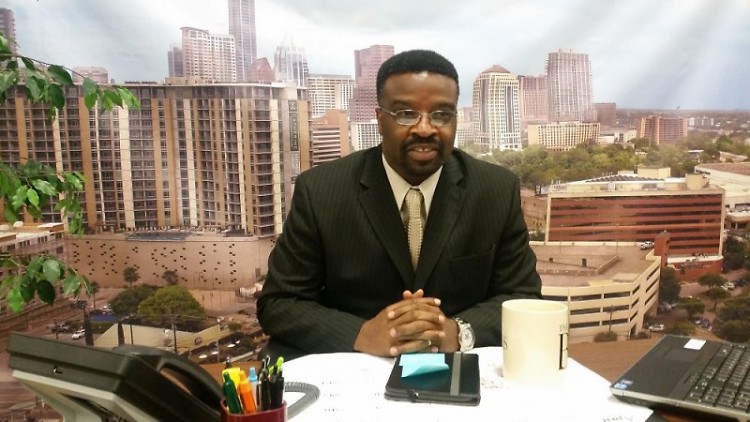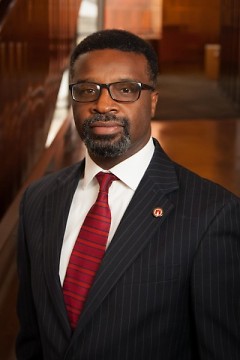Lyonel LaGrone reached out to Grand Rapids' new City Manager, Mark Washington, who currently works as the Assistant City Manager in Austin, Texas, for a personal interview. LaGrone watched the City Manager interviews at the end of July and was interested to hear Washington address many of the issues he regularly deals with in his role as Policy Liason at LINC UP. Washington answered questions on everything from family, fitness and faith to favorite foods and his first 90 days in Grand Rapids.
What is the makeup of your family?
Ardina and I recently celebrated our 24th wedding anniversary on August 6, 2018. We have two beautiful daughters who are age 17 and 11. My oldest daughter is a senior in high school and is finishing up her senior year in Austin before going to college. The rest of the family is Grand Rapids bound after my oldest daughter graduates. I am looking forward to having an extended family in Grand Rapids in addition to my immediate family to include a work-family, church-family and community-family.
Where did you meet your wife?
I met my wife in college at Tarleton State University. I was an undergraduate student at the time and she was in graduate school. We first met when we were both Big Brother and Big Sister mentors. We were matched as a couple to mentor the same student. We later found out we had a lot in common as we were both business majors. My fraternity, Alpha Phi Alpha and her sorority, Alpha Kappa Alpha, also partnered on several projects and that also allowed us to work closely with each other and further our relationship. We married shortly after I graduated.
I understand you have a degree in ministry (among others) what do you see as the connection between ministry and public service?
Yes. After I acquired a Bachelor’s and Master’s degree in Business Administration, I attended seminary for eight more years as a part-time student to work on another Master’s Degree and Doctoral degree while working full-time as a Public Administrator in Fort Worth and Austin. I think Public Administration and Ministry are both about being servant-leaders and serving others. Both vocations requires altruism, humility and sacrifice in order to effectively lead and engage others. I feel that City Management is not just a vocation for me, but it is a divine call for me to serve others.
What is your favorite food?
Chicken–grilled chicken, baked chicken; roasted chicken, stuffed chicken, sautéed chicken, braised chicken and barbeque chicken (every way except fried).
What is your favorite color?
No particular single favorite color, but I do like the combination of black and gold.
And your favorite pastime?
One of my favorite pastimes is participating in Crossfit activities. Balance is something I strive to achieve and I am thoroughly challenged mentally through public service and spiritually through my own personal spiritual formation. I try to be as intentional about my physical fitness as I am in other areas of my life to promote harmony among mind, soul and body. Crossfit allows me to personally challenge myself and reinforce the values of discipline, preparation, determination and perseverance. It’s also a stress reliever and helps me empty my mind and push my body to the point where the only thing I can focus on is taking the next breath. In that moment of extreme physical exertion, I become really appreciative of the basic things in life such as breathing!
Moving on to city business, what do you want to accomplish in your first 90 days?
I want to listen, establish effective working relationships with the commission, community and workforce in order to appreciate and prioritize the issues. There is a history and context around the community and each challenge that I really need to gain appreciation. I think there will be opportunities to weigh in and provide direction on many issues but I want to learn the people.
Speaking of first 90 days, when will you start here?
October 1, 2018.
How will your experience in Austin benefit Grand Rapids? I spoke to a friend down there, she said they miss you already!
I think the issues that Austin has experienced as a growing City are some of the same issues that Grand Rapids is facing. From 1990 to 2017, the population in Austin doubled with over 100% growth rate. Austin did not anticipate that growth rate in 1990 and went from a mid-size community of 465,622 residents to a large urban area with almost 1 million residents in 2018. The City increased by almost 200,000 residents between 2010 and 2018. I was part of the leadership team when the City began deliberately planning for growth around 2009. The City then adopted a comprehensive master plan in 2012 to address issues such as economic development and diversification, housing availability and affordability, workforce development, mobility, education, environment and fiscal sustainability.
Although Grand Rapids is not growing at the rate and pace of Austin, the issues such as housing, mobility, economic development, homelessness, labor issues and police-community relations are the same. However, I think Grand Rapids has the benefit of seeing growth coming and learning from the experiences of Austin and other communities to make sure it is smart, sustainable and equitable. Once Austin realized it could no longer curve the growth trend; the City began to rethink its future and imagine a new Austin over the next 30 years that would be a place where everyone could prosper in a livable city. The City had to be intentional with plans, funding, programs and partnering to address the emerging urban issues associated with growth.
I certainly will not have all the answers for every issue in Grand Rapids but my experience in Austin and Fort Worth will aide me in engaging our commission, community and organization in ways that allow us to collectively address these complex issues…together.
And one more question, new age or old school barber?
Wherever I can get a good cut, short wait time, good conversation and a nice fade.
The Rapidian, a program of the 501(c)3 nonprofit Community Media Center, relies on the community’s support to help cover the cost of training reporters and publishing content.
We need your help.
If each of our readers and content creators who values this community platform help support its creation and maintenance, The Rapidian can continue to educate and facilitate a conversation around issues for years to come.
Please support The Rapidian and make a contribution today.


